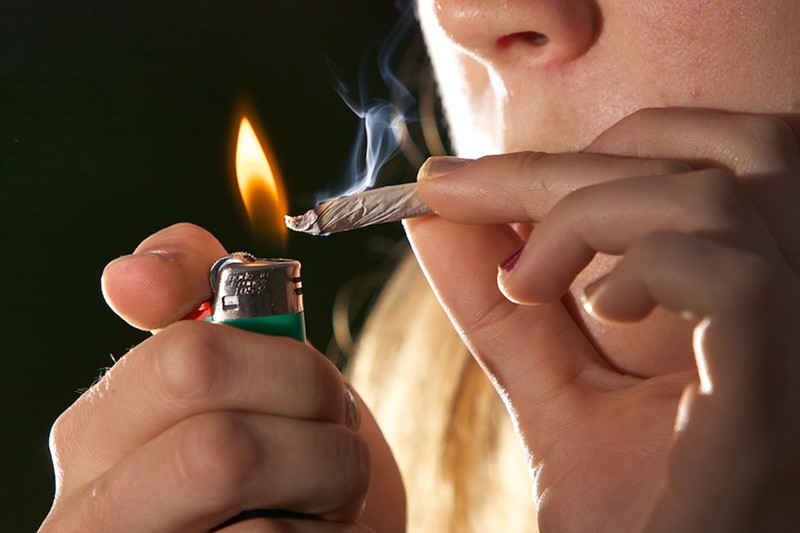As momentum behind legalizing recreational marijuana in Florida continues to grow, Republicans are tapping new wells for cold water to throw on the movement.
Tuesday, Harvard Medical School professor Bertha Madras gave an hourlong presentation about the dangers of marijuana in front of the state House Health and Human Services Committee. Madras, who was invited to speak by committee chairman Ray Rodrigues, made a fervent case against the legalization of recreational — and even medicinal — marijuana use.
"Marijuana is not benign. It is not safe. It is addictive," Madras told lawmakers. "It took our nation more than 20 years to raise alarm bells around the opioid issue. The alarm bells are beginning to come in with marijuana, and we hope people are listening."
Among other complaints, Madras warned that pot has become far more potent than it was in decades past. Concentrations of THC in marijuana — the chemical that produces a high when ingested — have increased exponentially since the '50s. This increase in THC, along with a decrease in CBD, which can be used medicinally to reduce pain and anxiety, has exacerbated potential damages from marijuana use, including learning and memory impairment, vulnerability to psychosis, and proneness to other drug use, she said.
Madras based her conclusions on a series of national and international studies, many of which were included in the highly criticized recent book Tell Your Kids: The Truth About Marijuana, Mental Illness, and Violence, by author and journalist Adam Bernson, which Madras called "empowering" for parents and others. Unlike Bernson, Madras is a medical professional. Nevertheless, Madras was all too eager to jump ahead of existing evidence in many cases.
It suffices to say Madras seemed to select many of the studies based on whether their conclusions were favorable to her position. Much of the presentation discussed research about the rates of psychosis caused by marijuana, as well as recent studies on how legalization has affected marijuana use and pot-driven hospitalizations in states such as Colorado. But Madras' concerns appear overblown or, at the minimum, overstated in light of current literature about the drug's effects.
What she described as strong, consistent correlations of marijuana use and psychosis are depicted in much more careful terms by other experts. In 2017, the National Academies of Sciences, Engineering, and Medicine published a comprehensive review of more than 10,000 studies on marijuana published since 1999. In that report, the authors write that although the risk of developing psychosis or schizophrenia is higher for marijuana users, the connection between these and other mental illnesses and pot "may be multidirectional and complex."
Another recent meta-analysis found a strong link between marijuana use and psychotic disorders, including a higher likelihood of having suicidal thoughts among heavy users — but the issue of causality is still far from settled. Put simply, psychosis isn't necessarily caused by pot. It could be that those suffering from psychosis are simply likelier to use cannabis. Other factors, such as genetics, could also cause both psychosis and a predisposition to use marijuana.
Madras' argument about marijuana being a gateway to other drugs is also questionable. Research shows that marijuana users are likelier to use harder drugs. But the same goes for people who drink and smoke cigarettes. Indeed, it's more than plausible that cigarettes, alcohol, and weed are so-called gateway drugs for many people simply because they are the most accessible.
Then there's the experience of states that have recently legalized recreational marijuana, such as Colorado and Vermont. Madras made a point of highlighting increased pot-related hospitalization rates following Colorado's legalization of recreational marijuana in 2012. As pointed out in a 2018 fact-check by Politifact, the fact that hospitalizations involving people who use marijuana have jumped over the past decade in legal states does not mean marijuana is causing more people to go to the hospital. For example, you could show up at a Colorado hospital with a badly bruised toe and it would be considered a marijuana-related issue if you were high at the time or if you admitted to smoking pot at all. The increase in the number of high patients showing up at hospitals could be a product of more people using marijuana overall compared to past years.
Madras was right that marijuana use increased in Colorado after recreational pot became legal. But then again, it was increasing before it became legal. More important, marijuana use among young people, which is one of Madras' principal concerns, remained more or less constant after legalization in the Centennial State, according to a Politifact analysis of studies of usage relying on self-reported data.
"I acknowledge that not all users respond to the drug in the same ways and not all studies agree on the adverse consequences or potential benefits of marijuana," Madras said at the beginning of her presentation, seemingly hedging her conclusions. "But I also question whether decades-old reports claiming marijuana to be relatively benign [are] relevant in 2019 based on our current experiences."
A few minutes later, Madras broke her own rule about depending on old studies when she cited a strikingly flawed report from well over a hundred years ago about levels of psychosis among asylum inmates in India attributable to marijuana use. According to Madras, the report is valuable because it predates the arrival of politics surrounding the issue of marijuana legalization.
After Madras finished, Rodrigues, who is opposed to legalization, told reporters: "I think what she has presented should bring pause to anyone who has heard those facts on whether recreational is a good idea for the state of Florida."
Rodrigues' decision to invite someone like Madras to speak before the committee is no coincidence. Three ballot initiatives to legalize recreational pot could end up in front of Florida voters in 2020.
In 2016, Florida voters passed a ballot item allowing medical marijuana for people suffering from various painful conditions. In the leadup to the vote, Madras wrote an op-ed published in Sunshine State News urging Floridians not to pass medical pot. In 2017, she joined President Donald Trump's special commission on the opioid crisis. A commission report from that year notably did not respond to thousand of public comments suggesting marijuana as a potential solution for opioid users.
Exaggerations aside, Madras was on the mark with her concerns that the public's knowledge of the risks of marijuana use is poor and that the science on its effects is not close to where it needs to be. Smoking marijuana is not risk-free — in fact, it's particularly risky for pregnant women, people with existing mental issues, and anyone with respiratory problems — and further research could reveal other worrying side effects of marijuana use. But for now, it's worth keeping in mind that the effects of pot, we know with a high degree of certainty, are far less damaging than those of alcohol or tobacco.

Audio By Carbonatix
[
{
"name": "Air - MediumRectangle - Inline Content - Mobile Display Size",
"component": "19274298",
"insertPoint": "2",
"requiredCountToDisplay": "2",
"watchElement": ".fdn-content-body",
"astAdList": [
{
"adType": "rectangle",
"displayTargets": "mobile"
}
]
},{
"name": "Editor Picks",
"component": "17482312",
"insertPoint": "4",
"requiredCountToDisplay": "1",
"watchElement": ".fdn-content-body",
"astAdList": [
{
"adType": "rectangle",
"displayTargets": "desktop|tablet"
},{
"adType": "rectangle",
"displayTargets": "desktop|tablet|mobile"
}
]
},{
"name": "Inline Links",
"component": "18711090",
"insertPoint": "8th",
"startingPoint": 8,
"requiredCountToDisplay": "7",
"maxInsertions": 25
},{
"name": "Air - MediumRectangle - Combo - Inline Content",
"component": "17482310",
"insertPoint": "8th",
"startingPoint": 8,
"requiredCountToDisplay": "7",
"maxInsertions": 25,
"watchElement": ".fdn-content-body",
"astAdList": [
{
"adType": "rectangle",
"displayTargets": "desktop|tablet"
},{
"adType": "rectangle",
"displayTargets": "desktop|tablet|mobile"
}
]
},{
"name": "Inline Links",
"component": "18711090",
"insertPoint": "8th",
"startingPoint": 12,
"requiredCountToDisplay": "11",
"maxInsertions": 25
},{
"name": "Air - Leaderboard Tower - Combo - Inline Content",
"component": "17482313",
"insertPoint": "8th",
"startingPoint": 12,
"requiredCountToDisplay": "12",
"maxInsertions": 25,
"watchElement": ".fdn-content-body",
"astAdList": [
{
"adType": "leaderboardInlineContent",
"displayTargets": "desktop|tablet"
},{
"adType": "tower",
"displayTargets": "mobile"
}
]
}
]












